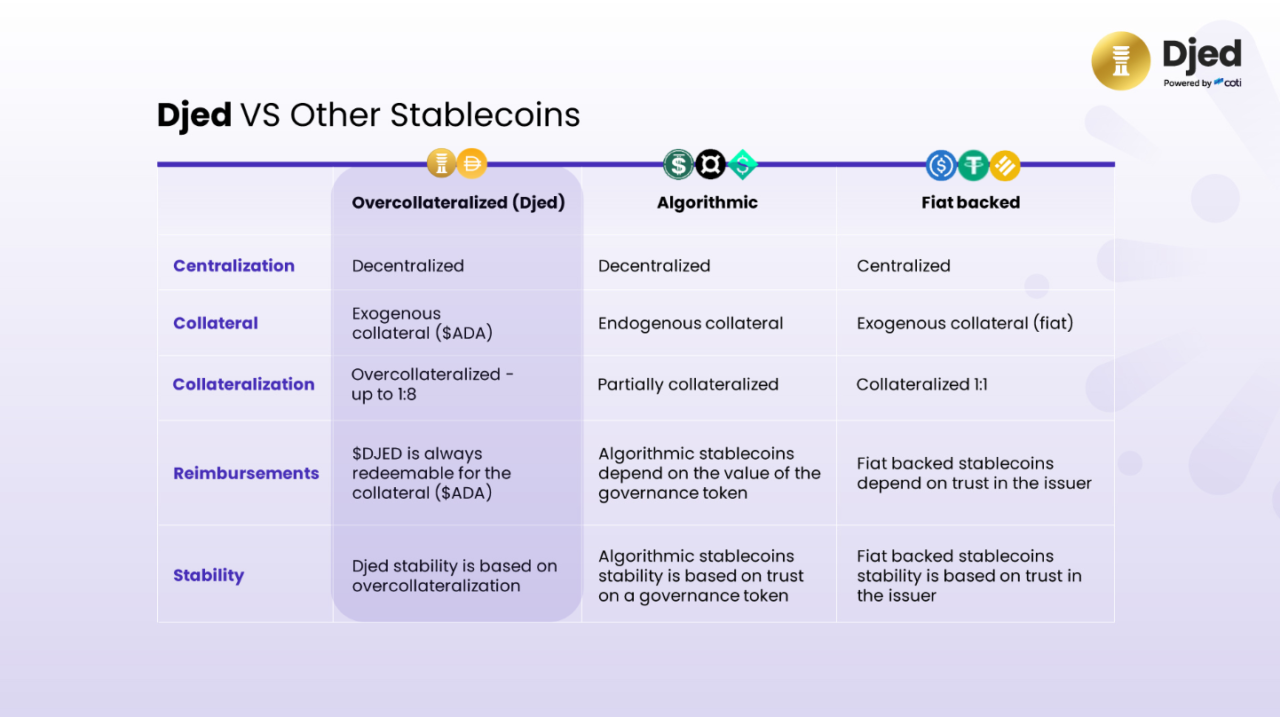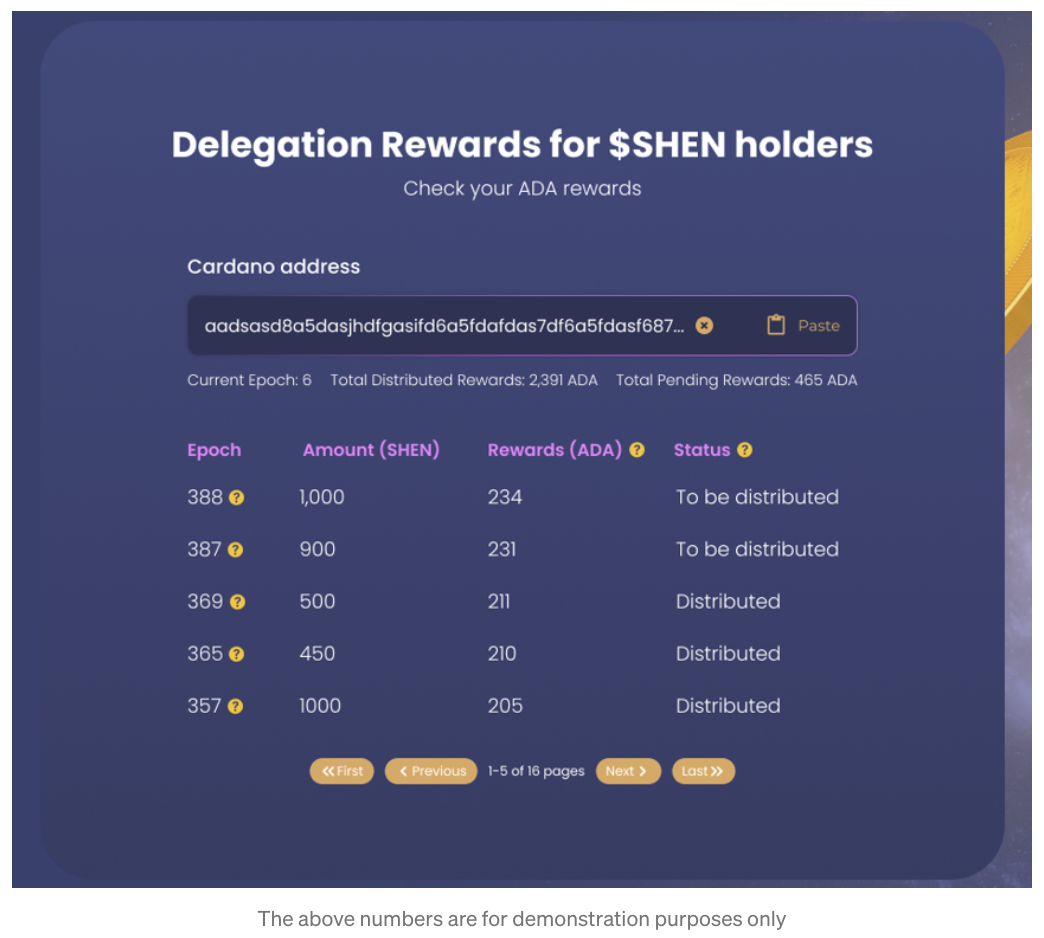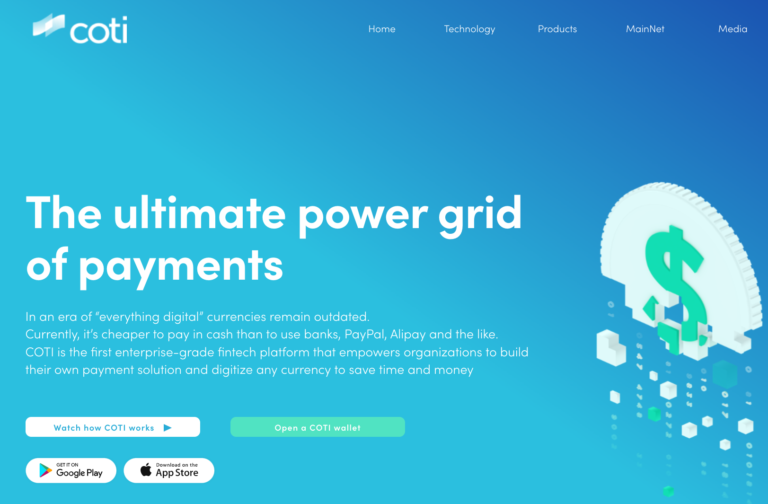This article looks at Djed ($DJED), which is an “overcollaterized” Cardano-powered stablecoin developed by IOG and issued by FinTech startup COTI Group, and in particular, how holders of Djed’s reserve coin $SHEN can receive delegation rewards from day one.
What Is $DJED?
On 26 September 2021, day two of the two-day Cardano Summit 2021, IO Global (IOG), the blockchain technology firm responsible for the research and development of Cardano ($ADA), and FinTech startup COTI Group, unveiled Djed, a formally verified crypto-backed pegged algorithmic stablecoin for Cardano that was designed by the former and is issued by the latter.
Djed’s use of smart contracts ensures price stabilization. Djed can be useful in decentralized finance (DeFi). It works by “keeping a reserve of base coins, and minting and burning stablecoins and reserve coins.”
The following is the abstract from IOG’s white paper (released on 17 August 2021) for Djed:
“This paper describes Djed, an algorithmic stablecoin protocol that behaves like an autonomous bank that buys and sells stablecoins for a price in a range that is pegged to a target price. It is crypto-backed in the sense that the bank keeps a volatile cryptocurrency in its reserve. The reserve is used to buy stablecoins from users that want to sell them. And revenue from sales of stablecoins to users are stored in the reserve. Besides stablecoins, the bank also trades reservecoins in order to capitalize itself and maintain a reserve ratio significantly greater than one.
“To the best of our knowledge, this is the first stablecoin protocol where stability claims are precisely and mathematically stated and proven. Furthermore, the claims and their proofs are formally verified using two different techniques: bounded model checking, to exhaustively search for counter-examples to the claims; and interactive theorem proving, to build rigorous formal proofs using a proof assistant with automated theorem proving features.“
In a blog post published on 26 September 2021, IOG said that Djed “operates by maintaining a reserve of base coins, while minting and burning various other stable assets and reserve coins” and that “it is designed to be used for paying transaction fees on the Cardano network,” which helps to “make transaction costs more predictable, so avoiding volatile and exorbitant gas fees for users.”
The COTI team believes that “stablecoins are a ‘killer app’ that will be adopted by a large number of crypto users for settling payments and covering fees.”
Shahaf Bar-Geffen, the CEO of COTI Group, had this to say:
“The stablecoin ecosystem has matured tremendously over the past few years. Blockchain participants are using stablecoins to engage in everyday transactions because they allow monetary value to be exchanged in a seamless manner, regardless of the sender and recipient’s location. I believe that adding the Djed stablecoin to the Cardano blockchain will significantly improve how transactions are settled on the platform.“
And IOG Co-Founder and CEO Charles Hoskinson stated:
“The Djed stablecoin could be a game-changer in the crypto space, appealing to an entirely new audience at a time when the industry is already experiencing astronomical growth. Djed shares our commitment to formal verification, proving a robust method of combating price volatility of crypto markets.
“COTI has been a long-time partner of the Cardano ecosystem. It’s great to have them on board with this new venture.“
Also, on 26 September 2021, COTI published a blog post (titled: “Why Being the Issuer of Djed, Cardano’s Official Stablecoin, is a Game Changer for COTI”), which had this to say:
“Djed isn’t just a stablecoin built upon Cardano’s chain, it is also designed to become the ultimate coin with which Cardano’s entire network transaction fees will be paid. It makes more sense for a chain to have predictability in how much transaction costs, rather than have volatile gas fees, and Djed will do just that…
“While our main goal is to issue stablecoin for enterprises and merchants on COTI’s Trustchain, we also plan on being involved with stablecoin issued on other chains. Our long relationship with Cardano, leading to an equity investment by their ecosystem fund, has created the opportunity for COTI to become the official issuer for Djed, Cardano’s stablecoin.
“As part of COTI’s role, COTI is in charge of developing the user interface system and will operate the integration between users to the smart contracts for the stablecoin. COTI will partner with enterprises, developers, and others parties who wish to mint both the stablecoin and the reserve coin used as part of the pegging algorithm.
“$DJED and its reserve coin’s mint and burn fees will be charged in $ADA and will be entered into the equity pool of the protocol. The reserve coin holders get a share of this pool as an incentive for their participation in maintaining the $DJED peg ratio.
“As the provider of this service, users will be subject to operating fees that will be paid in $ADA and deducted from the initial deposit and operational costs. We plan on converting such $ADA fees to $COTI coins, initially by buying $COTI directly in the market and supporting the demand for $COTI, then by depositing such $COTI in COTI’s Treasury, for the benefit of the Treasury users. It’s a real win-win and a great opportunity for the COTI ecosystem.“
What Is $SHEN?
On 23 February 2023, COTI published a blog post that provided some information about Djed’s reserve coin $SHEN:
“In simple terms, Reserve Coins are digital tokens that maintain the algorithmic peg of stablecoins. By trading Reserve Coins, users can contribute to the stablecoin mechanism by providing the appropriate liquidity to maintain a sufficient peg ratio. By utilizing a reserve, base fees can be charged, collected, and pooled for transactions facilitated by the underlying stablecoin. Reserve Coin holders then get a share of this transaction pool as an incentive for their participation in maintaining the stablecoin peg ratio…
“‘Djed’ is an ancient Egyptian symbol that represents stability… Continuing with the ancient Egyptian theme, we picked Shen as the name for Djed’s Reserve Coin. The Shen is a symbol of both royalty and symmetry…
“By buying and selling Shen, users are able to maintain Djed’s USD currency peg while earning a share of transaction fees in the reserve pool. Since the Reserve Coin is a tradable asset, holders can also profit from the short-mid term price fluctuations as an added incentive.“
Djed’s Stability Mechanism
Here is some information from Djed’s website that explains how Djed’s stability mechanism works:
“$DJED is an overcollateralized stablecoin that uses exogenous collateral ($ADA) to ensure stability. The protocol is backed by 400-800% overcollateralization and is guaranteed by its reserve coin, $SHEN.
“The stability of $DJED is based on overcollateralization, which eliminates the need for trust in a governance token as seen in algorithmic stablecoins. The platform is also fully decentralized and community-driven, allowing for open-source development and community involvement in minting and burning $DJED and $SHEN.“
Here is COTI explaining why it refers to Djed as an “overcollateralized” stablecoin rather than as an algorithmic stablecoin:

Benefits of Holding $SHEN
COTI says that there are incentives for holding $SHEN:
- “$SHEN holders receive all $DJED and $SHEN mint/burn fees
- Delegation rewards: Djed 1.1.1 will include delegation rewards for SHEN holders starting from day one!
- Long ADA: $SHEN’s price is correlated to $ADA price with an upside multiplier.
- Farming rewards: provide $SHEN liquidity to DEXs to farm rewards and receive their tokens as rewards, the APR can vary and depends on the DEX or platform“
How $SHEN Holders Can Receive Delegation Rewards
In a blog post published on 29 January 2023, COTI explained how $SHEN holders can receive delegation rewards:
“The $ADA that will be deposited to the reserve for minting $SHEN will collide along with the collected mint/burn fees for $SHEN and $DJED. This $ADA will be delegated to a dedicated public staking pool operated by Wave Financial, one of the most reputable stake pool operators in the Cardano network.
“In order to give $SHEN holders the priority in participating in the pool, and to deter non-related Djed participants from joining, the pool will charge an 8% operation fee from the staking rewards, in addition to the usual one-time fee of 340 ADA in all of their public pools. This fee will be offset by additional pledged $ADA added to the pool by Wave, that will yield increased rewards for $SHEN holders.
“The rewards received by the pool will be calculated based on a snapshot taken during each epoch. Delegation rewards will be automatically distributed to eligible $SHEN holders that held $SHEN during the epoch for which the rewards are distributed. The rewards from the pool will be distributed every 4th consecutive epoch (roughly every 20 days) and transferred to eligible $SHEN holders directly to their wallets without any additional action on their part.
“$SHEN holders will be able to check the status and the amount of their rewards on djed.xyz.“










